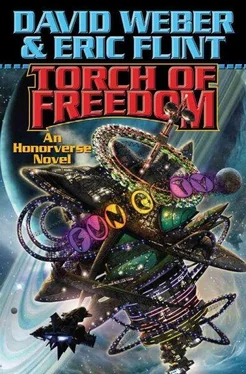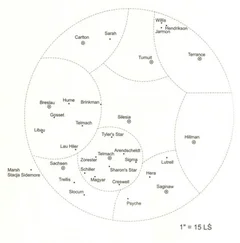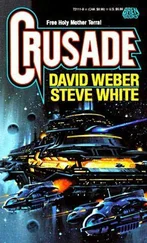Zilwicki clucked his tongue. "That's because you have the limited horizons and stunted vision of someone who's spent his whole life in the hall of mirrors. I didn't do it for intelligence reasons, Victor. I did it back in my yard dog days, so I'd have a gauge for businesses that submitted bids."
"And you're certain about this, Anton?" asked Web.
"Yes. There's simply no way to explain Manpower's recent behavior unless you introduce major non-commercial factors into the equation. The same's probably true for Jessyk and Technodyne, by the way, although we're not sure about that yet. But we don't think there's any question any longer that it's true about Manpower. Especially when you add this latest data concerning Monica to the information we already had. A corporation would no more behave like this than a corporate employee would behave like Ronald Allen."
Du Havel leaned forward, planted his hands on the table, puffed out his cheeks, and then blew out the air. "Well. I will be damned."
"We may all be," said Jeremy. "What do you think is happening then?"
"The simplest explanation," replied Victor, "is that the recent reverses suffered by Manpower and some other powerful Mesan corporations has driven the so-called Mesan 'government' to actually begin acting like one. If that hypothesis is true, then what we've actually been seeing are not Manpower operations but Mesan operations using Manpower as a cover."
Web cocked his head and looked at Cachat with a quizzical expression. "You don't seem too convinced by that explanation."
Victor shrugged. "It can't be ruled out. It's the simplest explanation, and the most famous of all dictums applies to intelligence work also."
"Oh, I know that one!" said Berry cheerily. "You're talking about Occam's Razor."
"Which is what?" asked Ruth, with some asperity. Her extensive knowledge of political and military matters did not extend to a solid grounding in the history of philosophy.
"I'm forgotten the exact words," said Berry. "But the gist of it is that whenever you're presented with two or more possible answers to the same question, always pick the simplest answer. It's the one mostly likely to be correct."
Web, who was quite familiar with Occam's Razor, had sat silently through the exchange. When Berry finished, he said: "But you're skeptical, Victor."
"Yes. I am." Cachat nodded at Zilwicki. "So is Anton."
Du Havel now looked at Anton. "Why?"
Zilwicki scowled. It wasn't much of scowl, actually, but it didn't take much given Anton's blocky face for him to resemble a very peeved dwarf king. "It's a fuzzy matter, admittedly. But I just find it too hard to believe that a planetary 'government' with the history of Mesa's could suddenly start operating as smoothly and efficiently as they seem to have been doing."
"I think it's just about impossible to believe," said Victor. "That so-called 'government' on Mesa has a lot more in common with the board of directors of a company than it does with a normal government."
Du Havel thought about it. There was certainly a lot of truth to what Victor was saying. The political structure of Mesa was essentially that of a corporation in which all free citizens owned voting stock. Slaves, of course, were permanently barred from ever owning voting stock. Indeed, they were barred from owning anything. Officially, at least. In practice, they were usually allowed to keep some personal belongings, just as in practice they were often allowed to earn some money on the side in various petty enterprises.
The CEO of Mesa was elected by the General Board of the star system. Membership on the board was split between the star system's major corporate entities and members elected by the free citizenry as a whole. The balance of power was unambiguously in the hands of the board members appointed by the major corporations, however. Elective members constituted only one-third of the General Board's total membership; the other two-thirds were appointed by the corporations on the basis of the percentage of the government's taxes which each corporation paid. Because Manpower was far and away the largest single corporation, and, indeed, provided almost sixteen percent of the government's total tax base, its appointees dominated the General Board and normally determined who would hold the office of CEO.
In addition to the appointments Manpower could make in its own right, it had carefully concealed (or, at least, carefully never mentioned) relationships with other major Mesan corporations, through which it controlled the appointment of still more members of the General Board. For example, the Jessyk Combine was officially an independent corporation which appointed 4.5% of the General Board's members, but those appointments were actually controlled by Manpower. If their suspicion that a similar relationship existed with Mesa Pharmaceuticals, that would give Manpower control of—or influence over, at least—another 9.5% of the General Board. Between just those three nominally independent corporations, the Directors of Manpower probably controlled thirty percent of the General Board of the star system outright.
Under the Mesan Constitution, the CEO had to be selected from among the members of the General Board, which virtually guaranteed that he would come out of the ranks of the corporate appointees. And he was, indeed, the chief executive officer of the star system, in fact, as well as name. He served at the pleasure of the General Board, and no CEO could hold office continuously for a period greater than ten T-years, but while he held office, his power was effectively unlimited, and all decisions of government policy were made in a top-down fashion from his office, through an executive branch staff answerable directly to him. His budgetary proposals had to be approved by the General Board, but they were usually confirmed without a great deal of debate. In fact, the (extremely rare) refusal by a General Board to endorse the current CEO's budget proposals was the equivalent of a vote of no confidence, and terminated that CEO's term of office immediately.
It was certainly not a political structure that lent itself to suppleness and risk-taking. So far as that went, Du Havel agreed with Victor. On the other hand, he thought Cachat's egalitarian political philosophy sometimes blinded him—partially, at least—to certain realities.
Governments run along corporatist lines were actually fairly common in the galaxy, and Mesa was by no means the sole example. As originally established, for instance, the original Manticoran government had been set up in a very similar fashion. True, it had change extensively over the centuries, but change was the one true constant of human institutions, when one came rdown to it, and many another star nation had evolved into a corporatist form, rather than away from one.
And, done properly, they worked just as well as any other system. Which was to say, never perfectly, but often more than well enough to get by with.
Beowulf was a case in point, actually, since it also had a corporate political structure which mirrored its economic structure. The shareholders who owned all of the stock in the Corporation (which, in turn, owned the entire Beowulf System) elected a Board of Directors and Corporate officers, who then ran the Corporation and were responsible for providing necessary public services to the citizens of Beowulf. This structure had persisted, essentially unchanged, for the better part of five hundred T-years, and was retained in outer form even today, to some extent. Yet Beowulf's government was quite capable of behaving like a genuine national state, and not just a squabbling oligopoly.
That said, Du Havel thought Cachat was probably right. The key difference between Beowulf and Mesa was slavery. About seventy percent of Mesa's population were slaves. That crude and simple demographic reality placed its stamp on every aspect of Mesan society. True, the thirty percent of Mesa's population who were not slaves enjoyed a high degree of individual civil liberties and were quite well provided for by the various corporations for whom they worked in what amounted to a patron-client relationship. In no small part, though, that represented a payoff from the corporations to their clients as a way to help defuse any inclinations towards abolitionism.
Читать дальше












